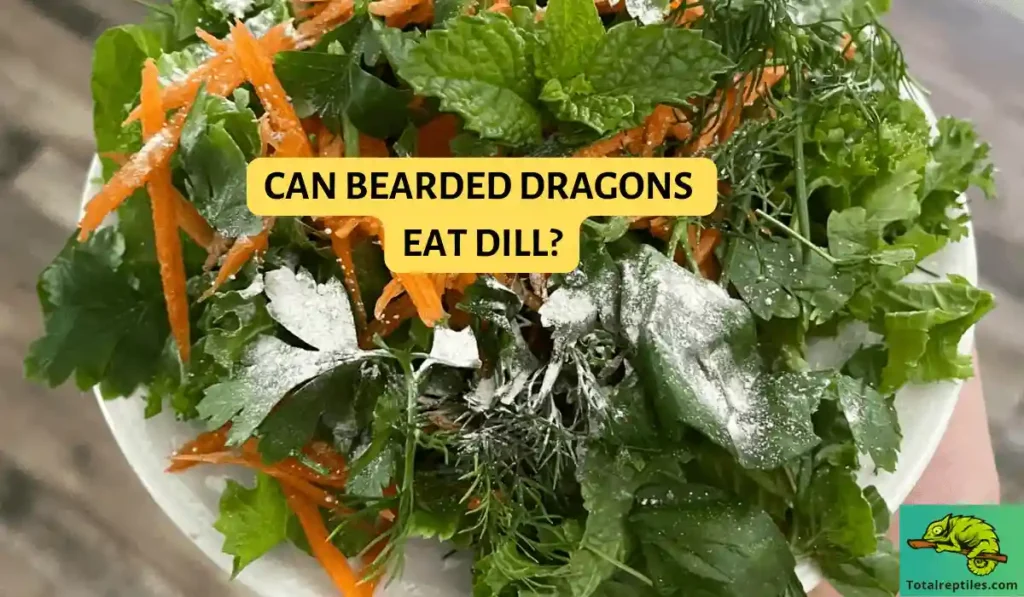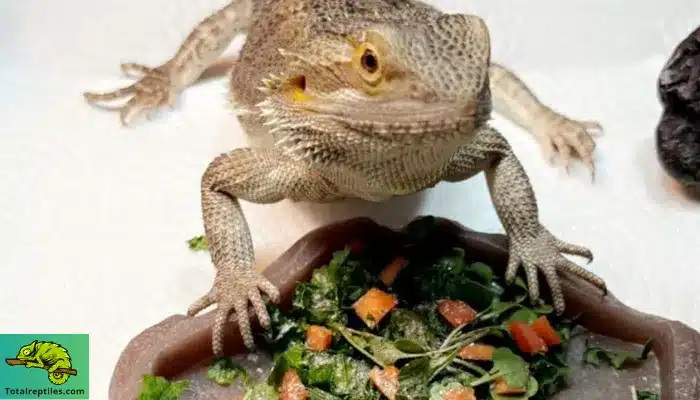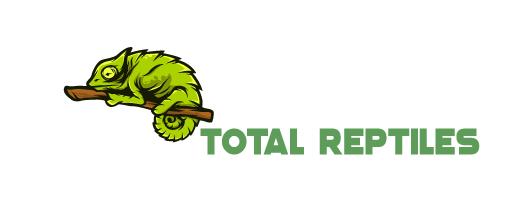Bearded dragons can safely consume small amounts of dill because it contains beneficial nutrients like vitamin A, calcium, and antioxidants. As a fellow bearded dragon lover, I know how tricky it can be to determine which human foods are safe for beardie. Dill is one of those herbs that seems questionable.
Let me start by reaching the point: bearded dragons can eat dill!
But I know you probably have many other questions rotating around in your head. Can they eat dill pickles? Is dill good or bad for beardies? How much is safe to feed them? Don’t worry- I will break it down in this guide to feeding dill to bearded dragons.

Can Bearded Dragons Eat Dill?
This seems like a “yes” or “no” question. We have to dig deeper for our bearded dragon!
Dill – Safe or Risky for Bearded Dragons?
* The Good News
* Dill contains beneficial nutrients like vitamins A and C, calcium, and manganese. These can support a beardie’s health in areas like:
- Vision
- Immune system function
- Reproductive system for females
* The vitamins and minerals in this herb give it antioxidant properties that reduce inflammation.
* This plant has traditionally been used to treat digestive issues.
* Most herbs and plants are considered safe for bearded dragons in moderation.
* The Not-So-Good News
* Dill has an unbalanced calcium-phosphorus ratio. Too much can prevent proper vitamin D absorption.
* It’s very high in vitamin A, which can cause toxicity in excess amounts.
* The acidic nature may irritate a bearded dragon’s stomach and intestines.
* Overfeeding any single food, even veggies and fruits, can cause nutritional imbalances.
So, yes, bearded dragons can eat dill sparingly as part of a varied diet under the watchful eye of their owners!
Nutritional Profile of Dill
Based on data from the USDA Food Data Central, here is an overview of the key nutrients found:
| Nutrient | Amount per 100g |
| Calories | 43 kcal |
| Protein | 3.46 g |
| Carbohydrates | 7.63 g |
| Dietary Fiber | 2.8 g |
| Sugars | 0.71 g |
| Fat | 0.96 g |
| Calcium | 208 mg |
| Phosphorus | 66 mg |
| Potassium | 738 mg |
| Vitamin A | 7717 IU |
| Vitamin C | 85 mg |
| Vitamin K | 0.1 mcg |
| Vitamin B6 | 0.184 mg |
| Folate | 150 mcg |
| Iron | 1.32 mg |
| Magnesium | 55 mg |
| Sodium | 61 mg |
| Zinc | 0.93 mg |
* Vitamin A – Required for eye and skin health. Do not overdo it!
* Vitamin C – Increases immunity to fight sickness.
* Calcium – Essential for proper bone formation and strength.
* Iron – Helps transport oxygen in the blood to organs and tissues.
* Manganese – Supports healthy brain function and nerve transmissions.
* Folate – Important for cell division and DNA synthesis.
Some other beneficial compounds:
* Flavonoids – These antioxidants reduce inflammation and cell damage.
* Monoterpenes – More antioxidants! Also, enhance flavor and aroma.
* Minerals -like magnesium, copper, potassium, and phosphorus.
So, while dill lacks the well-rounded nutritional profile of staple greens like collard or mustard, it can fill in some gaps if used occasionally.
* Dill provides vitamin A, unlike most other greens fed to bearded dragons.
* Its manganese content exceeds many leafy veggies.
* The antioxidants can’t be found in most standard fruits or vegetables.
Consider it occasionally as a nice nutritional boost rather than a dietary cornerstone. It adds diversity!
But sprinkling fresh or dried dill leaves into a salad every week or two can allow the bearded dragons to soak up these awesome micronutrients.
Potential Benefits of Dill for Bearded Dragons
Even though it’s not a staple food, it can provide some great benefits when carefully incorporated into a bearded dragon’s meal plan:
- Boosts eyesight from vitamin A
- Supports bone strength with calcium
- Aids healthy digestion and prevents constipation
- Provides hydration, especially important if your beardie is dehydrated
- Adds flavor variety to salads
But don’t go overboard! The potential risks outweigh leaving dill out altogether.
Signs of Dill Toxicity in Bearded Dragons
While uncommon in moderation, too much dill can cause toxicity in bearded dragons. Here are some warning signs to watch out:
- Diarrhea – Loose, watery, or frequent stools irritating the digestive tract.
- Dehydration – Dry mouth, sunken eyes, wrinkled skin.
- Lethargy – Decreased activity and energy levels indicate your bearded dragon isn’t feeling well.
- Loss of appetite – Eating less or refusing food may signal stomach upset from excess dill.
- Muscle tremors – Possible sign of vitamin D deficiency if it prevents calcium absorption long-term.
- Swollen limbs – Another indicator of improper calcium metabolism.
- Vomiting – Regurgitating food points to an irritated stomach.
Stop immediately and call your exotic vet if you observe any of these symptoms after feeding. They can run tests for vitamin A toxicity and calcium deficiency and provide appropriate treatment.
How Much Dill Can Bearded Dragons Eat?
Here are some tips on safe serving sizes and frequency:

- For adult beardies, limit to 1-2 times weekly.
- Baby dragons under 12 months old shouldn’t eat, as their digestive systems are too sensitive.
A single serving of dill for an adult beardie should be: - 2-3 fresh leaves
- 1-2 sprigs of dill weed
- 1⁄4 teaspoon of dried dill herb
- Always chop leaves into small pieces to prevent choking.
- Combine with other salad ingredients – don’t serve it plain.
- Avoid any dish as the main ingredient, like pickles.
- Introduce slowly to watch for signs of digestive distress.
By only feeding small amounts infrequently, you can prevent:
* Vitamin A toxicity – Too much can harm bearded dragon liver and kidneys.
* Calcium deficiency – inhibits calcium absorption long-term.
* Dehydration– Dill’s diuretic effect removes needed fluid.
* Diarrhea – From irritated digestive system.
Follow these serving size guidelines and monitor your bearded dragon’s poops, energy levels, and appetite after eating it.
Stick to a few times a month, and your bearded dragon can safely reap dill’s nutritional benefits!
Dill vs. Dill Pickles for Bearded Dragons:
Dill pickles taste amazing, but these delicious crunchy-brown cucumbers are a big no-no for your beardie. Here’s why:
- Too much sodium – pickles are preserved in salty vinegar. All that excess sodium is hard on your beardie’s kidneys and can cause dehydration.
- Garlic and spices – Pickling brines have many added ingredients, like garlic, mustard seed, and hot peppers, which can irritate a dragon’s digestive tract.
- Fermented foods – The good bacteria that make tangy pickles aren’t good bugs for your bearded dragon!
So, while a tiny sliver of a dill pickle as an occasional treat won’t harm an adult beardie, these should never constitute part of their regular diet.
The same goes for other pickled or brined foods like:
* Sauerkraut
* Kimchi
* Olives
* Pickled onions
* Salted capers or artichokes
When getting the benefits of dill for your bearded dragon, always go for fresh sprigs or leaves rather than soaked, fermented, or salted versions.
The preservatives change the nutrition profile – and not in a good way!
Replace pickles with small chunks of fresh cucumber to add crispness to salads.
So be sure to read labels carefully and monitor sodium content.
Tips for Feeding Dill to Bearded Dragons
Here are some pro tips for feeding it safely and effectively:
* Introduce slowly – Start with a bite or two to watch for signs of digestive upset or diarrhea.
* Pair with staple salad ingredients – Mix a few small dill leaves with greens like arugula, bok choy, and endive.
* Combine with other beneficial herbs – Basil, cilantro, and fennel are complements.
* Chop or mince finely – Cut leaves and stems into tiny pieces to prevent choking.
* Disguise if your beardie dislikes the flavor – Mix in fruits or sweeter veggies to mask it.
* Ensure proper calcium – The extra vitamin A makes calcium even more important—dust insects with calcium powder before feeding.
* Watch phosphorus intake – Too much phosphorus compounds the calcium absorption issues. Avoid high-phosphorus foods on days.
* Stay hydrated – Keep fresh water readily available to counteract dill’s diuretic effect.
* Monitor poops and behavior – Temporary diarrhea or lethargy may indicate doesn’t agree with your individual dragon.
* Ask your vet about supplements – They may recommend a multivitamin without vitamin A to balance the excess.
* Never use as a main food – It should only complement staple greens, veggies, fruits, proteins, and insects.
* Limit mostly to adult bearded dragons – Babies under 12 months old have trouble digesting it.
Follow these tips, and adding yummy dill into your beardie’s meals 1-2 times per week can boost their nutrition!
Conclusion
There you have it, folks – the complete lowdown on bearded dragons eating dill! While this zesty herb can provide some nutritional benefits for beardies in moderation, it also comes with risks when overfed.
By carefully controlling dill serving sizes and frequency, monitoring your dragon’s health, and pairing it with other well-balanced staple foods, you can safely incorporate it into their menu on occasion. Just be vigilant about signs of toxicity or distress. And as always, check with your trusted reptile vet before making any major dietary changes for your scaly friend!
Hopefully, this guide gave you all the important info you need to decide whether to add a sprinkle to your bearded dragon’s salad bowl.

